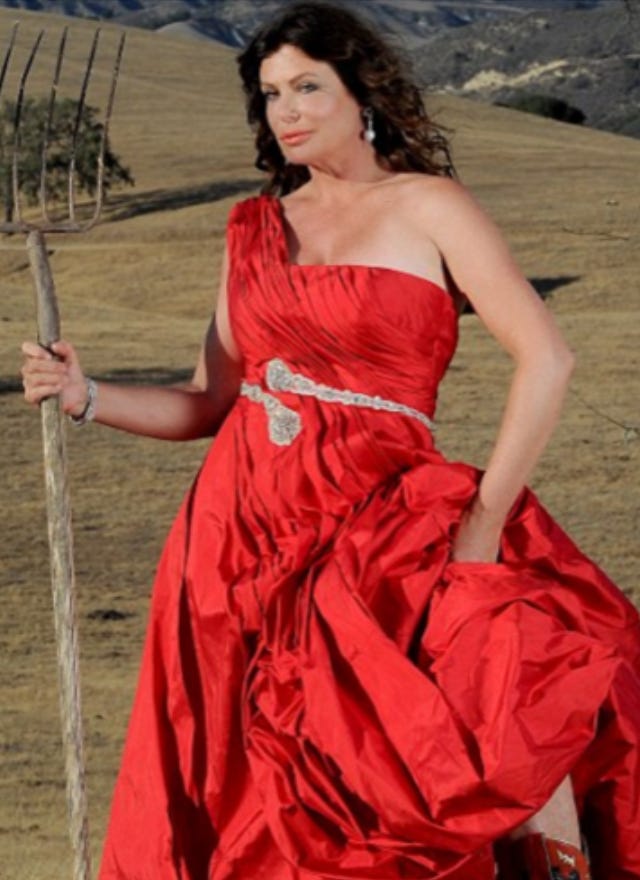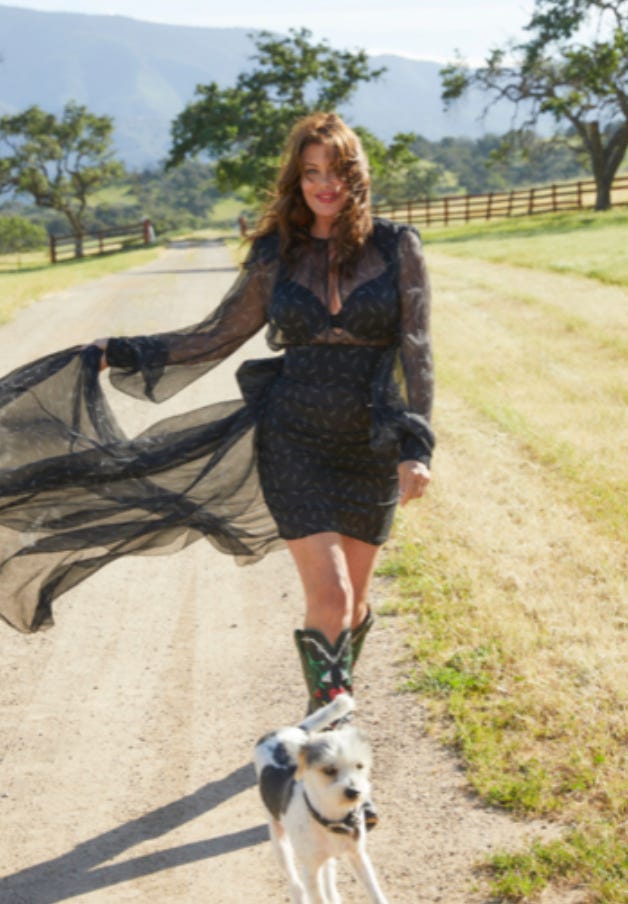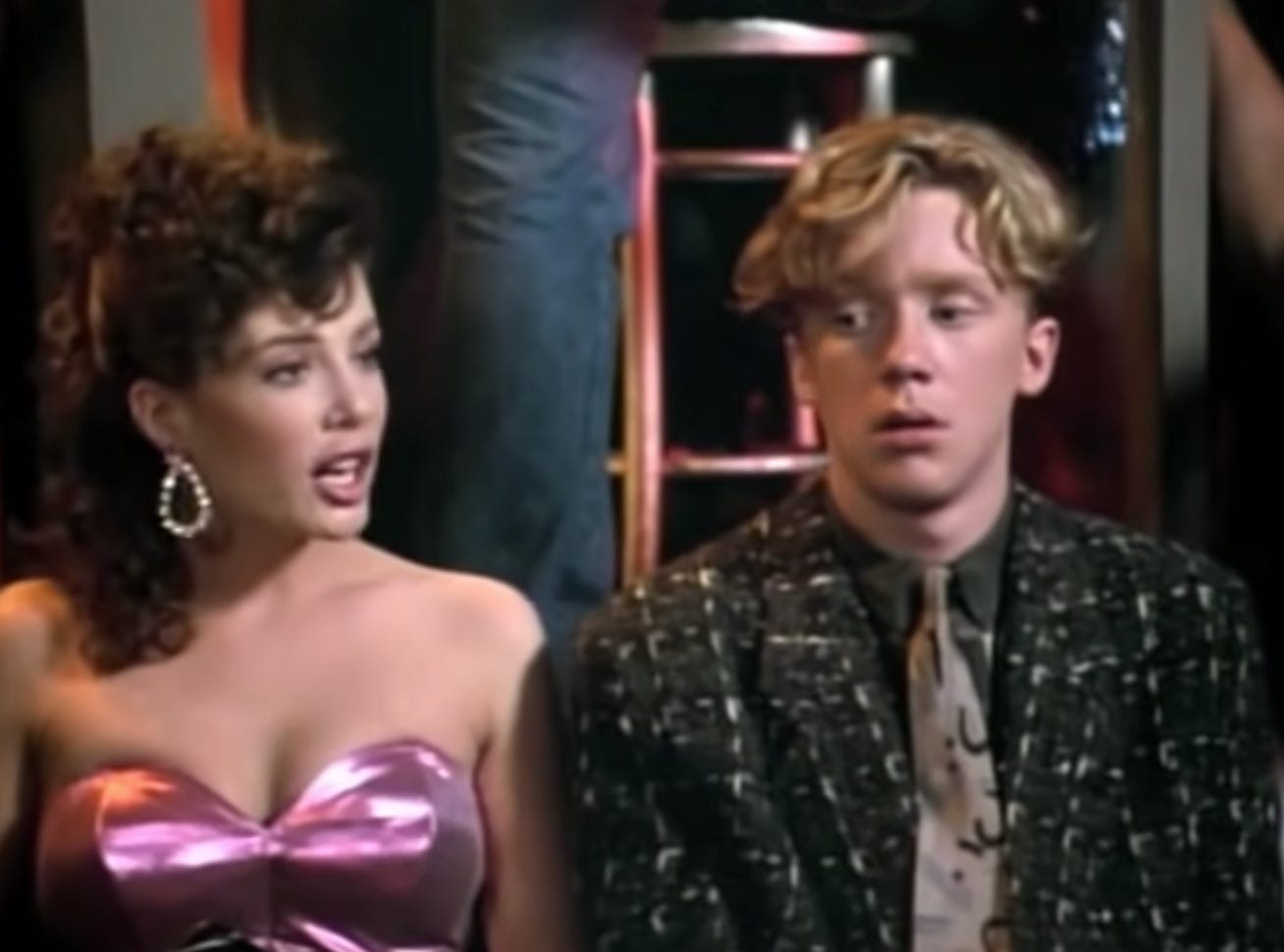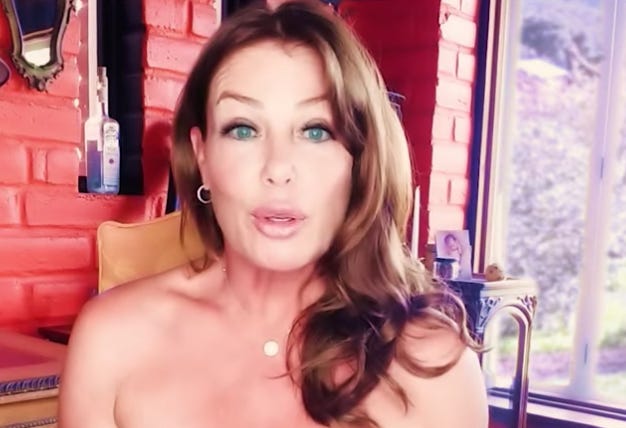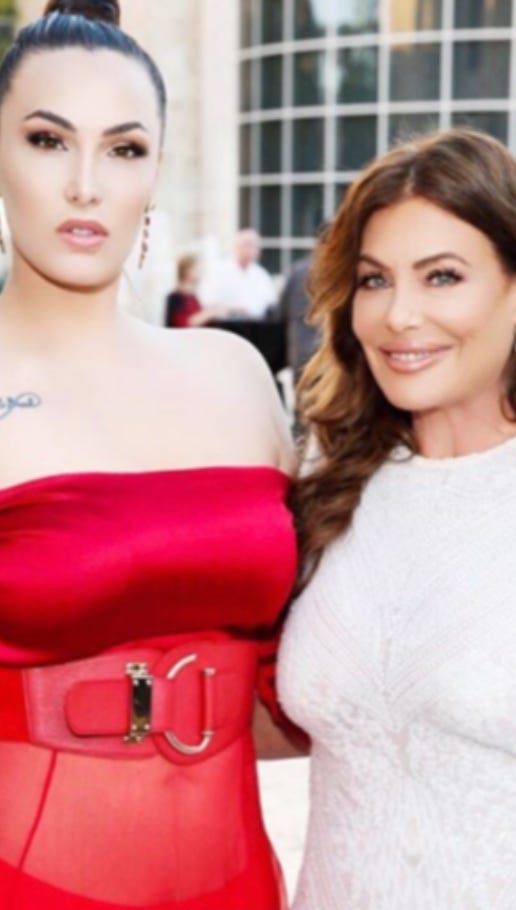Kelly Le Brock: "What Would The World Be Like Without Mirrors?"
An Interview with the Actress & Supermodel
I had a pubescent celebrity crush on Kelly Le Brock if there ever was one. When the. British actress starred opposite Anthony Michael Hall and Ilan Mitchell-Smith in Weird Science, I remember thinking the world stopped or my breathing stopped.
Watching the cult classic in the theater at age 12 made me suddenly aware that looks could probably kill. During the mid-80s, the supermodel appeared on the small screen as the spokesmodel for Pantene commercials. She notably excuses viewers from objectifying her with the slogan “Don’t hate me because I’m beautiful”.
During the mid-80s, Le Brock who was both a supermodel and actress appeared on the small screen as the spokesmodel for Pantene commercials where she excuses viewers from objectifying her with apologies in advance using the slogan “Don’t hate me because I’m beautiful”.
Courtesy Kelly Le Brock
With two feature films under her belt and more to come and as the spokesmodel behind an iconic brand, Le Brock was a stunning and upwardly mobile Hollywood star. She was the epitome of fame and not because she pursued it but because fame pursued her. The former actress, who runs her own ranch, is remarkably grounded and among a few who decided to trade in celebrity for normality.
As luck would have it, I know my celebrity crush and reached out to her for the following interview concerning the trials and tribulations of fame. Le Brock has a unique perspective for someone who attained the height of fame and is now poised to reflect on it critically.
Fame is fleeting and yet people covet it. Fame is also relative and yet people cherish every bit of it. We pursue fame because it seems to keep us relevant, but seeking it deludes us in an attempt to cheat death and attain a form of everlasting legacy.
Fame is fleeting and yet people covet it. Fame is also relative and yet people cherish every bit of it. We pursue fame because it seems to keep us relevant, but seeking it deludes us in an attempt to cheat death and attain a form of everlasting legacy.
Fame is also highly addictive, can lead to other forms of addiction like substance abuse, and in the worse case fame is potentially lethal. Those who have studied the psychological and emotional effects of fame addiction and fame worship have discovered just how hazardous clout chasing can be.
Whether we admit it or not, at some point in our lives we pursue fame or we pursue fame by proxy (by association). If we avoid the spotlight ourselves, we still gravitate toward those with clout and celebrity to elevate our own sense of relevance and importance. We seek fame or seek to surround ourselves with the influential because of our inherent insecurities and specifically our fear of not being seen, heard, and validated. A strong inclination to attain fame or chase those who have it simply for the sake of being noticed is narcissistic and this narcissism often stems from early childhood trauma.
The famous become slaves to their fans as much as fans become slaves to those they idolize. In fact, the more relationships one acquires through social capital, the more one has to engage and please. Those who don’t maintain relationships become replaced by those who do. Fame can be more than a burden. For many, fame has become a pathology.
Interview:
Jordan: When we first talked about doing this interview, we hadn’t corresponded in some time and the pandemic was fully underway. You said these were crazy times we are in, which is certainly a nice way of putting it. I think everybody agrees but maybe you can share a bit about how Covid has traumatized us all?
Kelly: I think we have learned how important family is and that being present and mindful and being off all these electronic devices can restore us to an earlier time when things were more simple and less stressful and that is how I like to live my life.
Jordan: You’ve been really famous, if not iconic. But you left the spotlight on purpose, which says something about how you felt about fame, but can you add to that?
Kelly: Fame can be very heady. It turns life upside down. People acclimate to fame depending on their reasons to be famous in the first place. In the end, we all want to be valued and some find that external validation in their search for fame, but it doesn’t ever satisfy our longing to be valued.
Jordan: At 16 you started modeling. Did you have a sense in those early years that you were becoming sought after, recognized, or even famous? Were you comfortable with the exposure?
Kelly: It was actually at a younger age that I began to get exposure. At 10 or 11 I was approached by Olympic coaches because of my swimming ability….. But even at 16, I was horribly shy. The idea of recognition or fame made me want to run for the hills.
Jordan: What do you think of fame now? In our individualistic society narcissism is running rampant. We can’t seem to get enough of ourselves.
Kelly: I agree. Today, people will do anything to become famous. There was a time when fame was associated with talent. We have become voyeurs of our own lives. In another interview I just did, I said that I often think about what the world would be like without mirrors. But Hollywood also supports or permits bad behavior because big-name performers fuel the money engine behind the entertainment industry.
Jordan: Life without mirrors is a poignant thought to ponder. Ironically narcissists do tend to spend more time in front of the mirror and also tend to be better looking than average. But science also shows that they put more time into their appearance in the first place. Dr. Reef Karim describes fame addiction as a “desperate need to be seen [in order] to self-soothe.” He discusses how the addiction afflicts people who are mildly or more well-known and how the burden of fame can lead to anxiety and impulsivity.
Kelly: I also think that most actors or well-known people also have some kind of anxiety and obsessive or compulsive need for validation to begin with. Anxiety creates this drive to succeed, but that is what makes narcissism a good thing.
Jordan: We have talked about how people in Hollywood become desensitized to self-adulation and grandiosity because it is all around them. But as you mentioned, you elected to move away from the entertainment capital?
Kelly: Yes, I moved with my kids to a rural area. I didn’t want them to know that I had a career in film, or that I was remotely famous. They eventually found out that their father has a different perspective on fame and exposure. But I also want to add that some amount of narcissism is healthy.
Jordan: Yes, some amount of narcissism is healthy and adaptive, but as you know when these traits emerge in a response to developmental and attachment trauma they can be quite detrimental to our health and wellbeing. It is clear that both celebrity and celebrity worship can lead to depression, anxiety, the inability to relate to others, dissociation, and concerns surrounding body image and aesthetics.
Kelly: One of the things about having children is that they save us. They give us purpose but they also challenge our narcissism, hopefully. When you have kids, there is a “them”, “us”, and not just a “me”. Having children forces us to detach from our obsession with ourselves.
Jordan: You mentioned that Covid has helped us become more grounded and in some cases less attached to technology. But media is also such a strong influence that it becomes hard for generations who grew up with social platforms and mobile devices to practice empathy. Did you let your kids watch television? Did you let them have cell phones?
Kelly: People don’t have chores and rituals like they used to. They lack discipline. They disconnect us from each other and from the way we naturally relate and communicate. Phones teach our children to self-isolate. Play and socialization are so important to their development, but we’ve lost that.
Jordan: Unfortunately and ironically, Covid has forced or encouraged us to spend more time alone. Loneliness kills but humor heals.
Kelly: For a long time, and even before Covid, I was dating my dog. And yes, we need narcissism and sarcasm, too. I say that people who don’t laugh get cancer.
Jordan: We do need to be connected to combat depression and anxiety and address our physical health. The Body Keeps the Score is a great book on Complex PTSD. And it is a timely read for people because Covid has been truly traumatizing to our minds and bodies. It is easy to be pessimistic, but I love how you see the duality in life and how things like narcissism can be both negative and positive. That is a healthy worldview.
Kelly: That is the only way. I went to a screening of a documentary for a guy who is a quadriplegic after a tragic accident. I call him knight rider. Despite his condition, he sees life as beautiful…. I used to get up every morning and cry but someone like this person who I call the Knight Rider inspires me to get up every day with gratitude.
Related Resources on the Drop-in Social Audio App Clubhouse.com:
Scapegoat Strength https://www.clubhouse.com/scapegoatstrength
Rise Like a Phoenix https://www.clubhouse.com/club/rise-like-a-phoenix
Hacking Narcissism https://www.clubhouse.com/club/hacking-narcissism
References:
Jabeen, F., Gerritsen, C. & Treur, J. (2020) Narcissism and fame: a complex network model for the adaptive interaction of digital narcissism and online popularity. Appl Netw Sci 5, 84
Lammers, D. (2016) Can You Really be Addicted to Fame? The Fix (Addiction and Recovery Straight Up)
Sansone, R. A., & Sansone, L. A. (2014). "I'm Your Number One Fan"- A Clinical Look at Celebrity Worship. Innovations in clinical neuroscience, 11(1-2), 39–43.
Zsila, Á., McCutcheon, L. E., & Demetrovics, Z. (2018). The association of celebrity worship with problematic Internet use, maladaptive daydreaming, and desire for fame. Journal of behavioral addictions, 7(3), 654–664.
Well, T. (2018) What Do Narcissists See When They Look in the Mirror? Psychology Today




